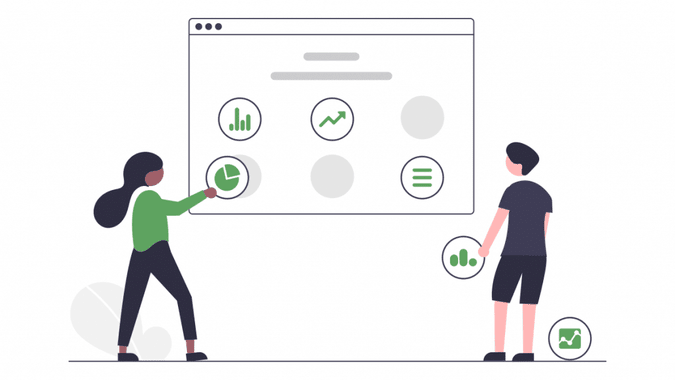On-line banking, having to pay bills remotely, and cellular wallet applications have made it a lot easier for corporations and consumers to interact with their money solutions suppliers. But online banking has also introduced consumers’ financial facts into the digital area, major to cybersecurity concerns.

Due – Thanks
Saved passcodes, automatic transactions, and products without having passwords can leave your monetary info susceptible to hackers. Financial corporations are regularly at operate hoping to avert shopper facts from becoming compromised or dropped. But eventually, a consumer’s data is only as protected as the precautions they consider.
This posting will explore the actions you really should get to safeguard your on the web economical data for both of those by yourself and your small business.
1 – Guard your money information with a new state of mind
It may possibly feel obvious, but the most significant issue to do when it will come to guarding your economical information is to begin with a new state of mind. This 1st suggestion is all about rethinking info protection.
Lots of men and women feel that they will hardly ever be impacted by data breaches. Or, that a info breach will have a negligible impact on their finances. Even so, this is not the situation. Info breaches are on the rise and extra and far more folks are falling target to these types of assaults.
By accepting that you are equally as susceptible as any one else, you can choose the very first stage in defending your economical info.
2 – Automated payments can stack up bills and give absent your information
Conserving cash and economical stability go hand-in-hand. A person way to help you save money and secure your details is to eliminate your payment information and facts from 3rd-occasion websites. Have you ever acquired anything on the web? Numerous on the web retailers retail store your fiscal and private details to make checkout much easier the subsequent time you want to buy one thing.
But if a person of these internet sites is hacked, the hackers can have entry to your title, address, and credit rating card variety. With all of this info, they can conveniently wreak havoc on your bank account.
Prevent these problems by deleting your payment information and facts from web sites. Alternatively, you can use a protected payment processor, like PayPal, to safeguard oneself. This way, only your necessary details is shared with the seller.
3 – Be on the lookout for social engineering and cons
The final point to do is to be knowledgeable of social engineering and scams. Social engineering is a time period describing when individuals goal you to try and persuade you to give up delicate information that will make it possible for them to split into your account.
For illustration, one particular widespread tactic is to persuade people today to divulge data relevant to their protection queries. Phishing, a carefully related tactic, will involve convincing folks to simply click backlinks or deliver delicate info to the mistaken individuals.
You can reduce identification theft and accidentally divulging delicate data by verifying that you are speaking with a highly regarded human being prior to sending details. Quite a few banking institutions will never get in touch with you to initiate make contact with, so look at with your financial institution to see what their speak to guidelines are. Keep away from participating in call with folks and sources that seem illegitimate.
4 – Safe your units
It may perhaps be tempting to check your 401(k) from your work laptop, but gadget stability is an typically disregarded spot of details stability. Any machine you use to obtain your economical facts can probably grow to be one more spot exactly where hackers and undesirable actors can acquire obtain to your information.
Although it may appear not likely that your get the job done pc could turn out to be a position-of-entry, by cutting down the quantity of equipment you use to log in for on-line banking, you minimize the threat of your sensitive info slipping into the mistaken hands.
5 – Financial institution from dwelling
In addition to machine stability, you need to also feel about where you entry your details from. Every person is wanting for methods to preserve much more income, and on the net banking can support you with that. But to keep your information safe and sound, it’s very best to only obtain your economic details from property.
When you make use of community Wi-Fi, you run the risk of your facts currently being intercepted by lousy actors. Don’t forget, accessing your facts from household does not promise you won’t be hacked, but it minimizes the danger.
6 – Allow Multi-variable Authentication (MFA) when offered
The moment you have removed areas where by your information could probably turn out to be exposed, you can also allow multi-element authentication (MFA) when it is available. MFA consists of utilizing a telephone amount, authentication application, or mobile phone phone calls to validate your id in advance of making it possible for you to log in to your account.
7 – Reinvestigate your password safety
1 of the easiest strategies you can protect your self is by reevaluating your passwords. A new analyze shown that even an 8-character password could be cracked in underneath an hour. These upcoming couple ideas will just take a appear at password safety specifically, and what you can do to make guaranteed your passwords are up to snuff.
8 – Eliminate saved passwords
Previously I talked about staying away from working with multiple products for accessing your lender details. If you’re compelled to use a number of units or obtain that it is required, make absolutely sure you delete your saved passwords. You should eradicate saved passwords on your most important products way too. If your laptop is unsecured, stolen, or misplaced, it’s greater that any wrongdoer will not have obtain to your lender facts.
9 – Choose a robust password
The next step in reexamining your password stability is to construct a stronger password. The more time your passcode, the safer it is. Bear in mind to use a mixture of lowercase and uppercase letters, quantities, and specific figures.
Many safety professionals advise applying a security passphrase of random terms. For case in point, the passphrase, “#Ingesting-Rubber-Ceilings” is considerably more protected than “$mydog8” due to the fact it is lengthier and is made up of a blend of specific characters and capitalization. On the furthermore facet, passphrases can also be less complicated to recall.
10 – Transform your passwords frequently
Even if you have the great password, remember to transform it frequently. Password info breaches can come about. If that is the circumstance, hacke
rs may attain accessibility to your password even immediately after you’ve expended the time to very carefully select a sturdy just one. Industry experts propose switching your password each couple months.
11 – Use a password manager
Now, a lot of folks have heard of password professionals, but they still really don’t use them. A password supervisor can generate safe passwords, store them for you, and continue to keep them all structured. When individuals often use the very same password across distinctive companies, a password manager can support prevent this trouble.
Password professionals aren’t infallible however and they can also be insecure. Over 29,000 enterprises have been impacted when a backdoored password manager had its details stolen.
Wrapping up
On the net banking and cell wallet applications make financial transactions practical, but that benefit doesn’t come with out a rate. It is crucial that you consider actions to make sure your individual and small business money data is shielded. At the incredibly minimum, use powerful passwords and multi-component authentication where possible, steer clear of vehicle-conserving your banking knowledge on 3rd-occasion web pages, and make confident to log in to your financial institution only from dependable networks.
The put up 11 Ideas To Help You Guard Your On the net Money Facts appeared to start with on Owing.







